
Recently, South Korean antitrust regulatory authorities have suddenly sparked a wave of antitrust regulation targeting the semiconductor industry, imposing a total of 10.46 billion Korean won (approximately 55 million yuan) in fines on 12 South Korean companies suspected of colluding to manipulate bidding prices. This incident has not only attracted widespread attention in the industry, but also sparked deep reflection on the future development of the semiconductor industry in South Korea.
It is understood that 12 companies, including PS ENG, Daean C&I, Doota IT, and others, were punished for colluding and manipulating prices during the bidding process for the semiconductor monitoring system released by Samsung SDS. This collusion not only affects the normal competitive order of the Korean semiconductor industry, but also leads to price increases and damages customers. The Fair Trade Commission (FTC) of South Korea has stated that it will crack down severely on such behavior and maintain fair competition in the market.
It is worth noting that South Korea's chip exports are currently experiencing rapid growth. According to the latest data released by the General Administration of Customs of South Korea, the overall export data of South Korean chips surged by 54.5% year-on-year in May this year, and the export of display products increased by 15.8% year-on-year. This is the seventh consecutive month of growth in chip exports, demonstrating the strong development momentum of the South Korean semiconductor industry. However, in this context, the sudden intervention of South Korean antitrust regulatory agencies undoubtedly brought certain impacts to the industry.
From an industry perspective, the semiconductor industry in South Korea has always maintained a high level of competition. However, with the intensification of market competition and continuous technological progress, some enterprises have begun to adopt unfair means to compete in order to maintain their own interests. The emergence of such behavior not only disrupts market order, but also hinders the healthy development of the industry. Therefore, the intervention of South Korean antitrust regulatory agencies aims to maintain fair market competition and promote the healthy development of the industry.
However, for the punished enterprises, this is undoubtedly a heavy blow. These enterprises not only need to bear huge fines, but may also face risks such as reputation damage and market share decline. At the same time, this incident will also trigger the vigilance and reflection of other enterprises in the industry, prompting them to strengthen their self-discipline and compliance awareness, and avoid similar behaviors from happening.
In addition, the South Korean government's emphasis on the semiconductor industry cannot be ignored. In mid May of this year, the South Korean government announced plans to invest 300 trillion Korean won (approximately RMB 1.58 trillion) to build the world's largest cutting-edge system semiconductor cluster in the Gyeonggi do region. The implementation of this plan will effectively promote the development of South Korea's semiconductor industry and enhance its competitiveness in the global market. However, while increasing investment, how to strengthen industry regulation and prevent the occurrence of unfair competition is also an important issue that the South Korean government needs to face.
In the long run, the anti monopoly regulatory controversy in South Korea has a positive impact on the entire semiconductor industry. It helps to eliminate the black sheep in the industry, maintain a fair competitive environment in the market, promote technological innovation and industrial upgrading. At the same time, this will also encourage enterprises to strengthen their self-discipline and compliance awareness, and promote the development of the entire industry towards a healthier and more sustainable direction.
Of course, we should also recognize that antitrust regulation is not a one-time solution. In future development, South Korea still needs to continue to strengthen regulatory efforts, improve relevant laws and regulations, and improve regulatory efficiency and quality. At the same time, enterprises should also strengthen their compliance awareness, abide by market competition rules, and jointly maintain the healthy development of the industry.
In summary, the sudden anti monopoly regulatory storm in South Korea has brought certain impacts to some enterprises and industries, but in the long run, it will help promote the healthy development of the semiconductor industry. We look forward to a bright future for the South Korean semiconductor industry under the dual effects of regulation and the market.

The U.S. third-quarter GDP growth rate, strikingly highlighted at 4.3%, not only surpassed market expectations but also earned the label of "the fastest in two years."
The U.S. third-quarter GDP growth rate, strikingly highligh…
Recently, US personnel intercepted a "Century" super oil ta…
According to Xinhua News Agency, the subtle changes in the …
The rapid development of artificial intelligence has brough…
In December 2025, Taiwan's political scene was shaken by a …
When Apple appears for the Nth time on the list of penaltie…